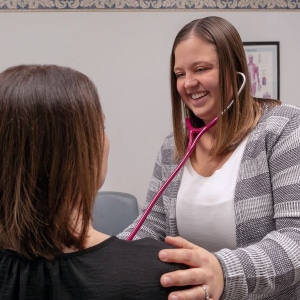The Importance of a Primary Care Provider
Your Primary Care Provider plays a vital role in the care of your health throughout your lifetime. This primary care week, learn more about the importance of a primary care provider.
 What is a Primary Care Provider
What is a Primary Care Provider
Your primary care provider is a doctor, nurse practitioner, or physician’s assistant who manages your overall health over time. Your PCP is someone you can develop a trusted relationship with. They get to know you, your history, and your family history and they have the best picture of your overall health.

Primary care providers may work in family medicine, internal medicine, obstetrics and gynecology, or pediatrics.
Here are some examples of things to see your primary care provider for:
- Regular health screening or wellness visits
- Management of chronic conditions
- Something is causing you concern or advice for a health problem
- Fever, cough, sore throat, cold earaches or rashes
- Unexplained weight changes
- Lingering pain
- Prescription refills
- Minor injuries such as sprains, back pain, minor cuts and burns, minor broken bones, or minor eye injuries
- Bladder or urinary tract infections
- Vaccinations
- Migraine headaches
Benefits of Primary Care Provider
There are many benefits of having a primary care provider including:
- Understanding your history. Your primary care provider has access to all of your medical records as well as your family history. This helps them see the full picture when it comes to your health rather than the snapshot other providers may get from a single visit at an urgent care or emergency room.
- Building a relationship. You get to know your primary care provider throughout your life and come to build a relationship with them. Because you become more comfortable with each other, they are able to better understand your medical situation and you may feel more comfortable bringing issues to them and asking questions you may have.
- Prevention and early detection. Your primary care provider can recommend regular tests and screenings based on your personal and family history. These regular checkups, tests, and screenings with the same provider make it more likely that any potential health issues will be caught early when they are most treatable.
- Condition Management. If you do happen to encounter a more complex health issue, they are crucial in coordinating care. They can refer you to necessary specialists, review all tests, prescriptions, and make sure everyone on your care team is working together. When multiple specialists are working together or you have multiple health challenges, your primary care provider is the link between them all.
Primary Care vs. Convenient Care vs. Emergency Care
There are many circumstances where you may require medical attention but are unable to see your primary care provider. This could be because it is outside of regular office hours or there are no available appointments and you need to care soon. This is where Convenient Care and the Emergency Department come in.
At convenient care, patients can walk in and receive services on a first-come, first-serve basis for minor illness and injury. Typically, the insurance co-pay is the same as a regular office visit. The convenient care provider will follow up with your primary care provider to let him/her know you were seen.
The ER is open 24/7 for any situation where you need immediate medical attention. The Emergency Room provides care for serious, and/or potentially life-threatening medical situations. If you are considering going, you probably should. If it’s a serious emergency, don’t hesitate to call 9-1-1.
When you arrive at the ER, you will be triaged and receive care based on the severity of the situation. You may have to wait a bit longer if there are other patients there with more serious conditions. The ER is also usually costlier than primary care and Convenient Care so it should be reserved for emergency situations where you cannot wait for care.
Convenient Care and the ER are not replacements for Primary Care. After you visit Convenient Care or the Emergency Room, you should still follow up with your Primary Care to talk about your visit and determine if any follow up with them is necessary.
If you don’t currently have a primary care provider, it’s never too late to find one. Fisher-Titus has providers accepting new patients several locations. To find a provider, visit www.fishertitus.org/find-a-physician or call 419- 660-2900.
About Dr. Canfield
Dr. Christina Canfield is a physician with Fisher-Titus Family Medicine in Wakeman and is the Chief Medical Officer of Fisher-Titus Medical Care. She has been practicing in the area since 1994. Fisher-Titus has five Family Medicine locations in New London, Norwalk, Milan, Wakeman, and Willard. For more information, visit fishertitus.org/access.
